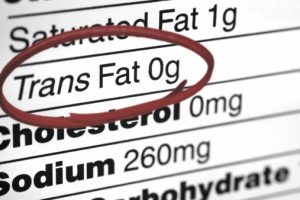Y our favorite foods are getting a makeover. More so their labels will start to look much differently as well. As you already know food labels reveal to us the nutritional value of food products. It outlines components such as fat content, carbohydrates, sugar and nutrition present.
our favorite foods are getting a makeover. More so their labels will start to look much differently as well. As you already know food labels reveal to us the nutritional value of food products. It outlines components such as fat content, carbohydrates, sugar and nutrition present.
As part of a healthy diet we monitor what we take in by keeping our fat, sugar and carbohydrates low. Although our bodies require these three components there is a difference between the healthy variety and the not so healthy ones.
Advertisement
Fat, in particular, is broken down into three varieties: Fat, saturated and trans fats. By now we have a fairly good understanding of fat and that we should limit our intake of saturated and trans fats. Well you may not have to worry any longer as the U.S Food and Drug Administration (FDA) has made a plea to remove trans fats completely from all food items.
What is trans fat?
 Before we can inform you on the drastic change the FDA is proposing let’s discuss what trans fats are to get a better understanding.
Before we can inform you on the drastic change the FDA is proposing let’s discuss what trans fats are to get a better understanding.
Trans fats are the product of liquid oils becoming solid. Vegetable oil is typically used and hydrogen atoms are added to make it hydrogenised. This process is done so that food items can last longer on the shelves and not spoil as quickly.
Although trans fats can be found in small amounts naturally – think red meat and dairy products like butter – they are most commonly seen in packaged goods like crackers, cookies, granola bars and salad dressings – yes, that means your salad dressing isn’t as healthy as you think!
Why are trans fats bad for our health?
As mentioned trans fats should be limited in one’s diet. Why? Well research shows that the consumption of trans fat can raise bad cholesterol – or LDL. The American Heart Association also notes that trans fat can contribute to a higher risk of heart disease and stroke. Furthermore it may also contribute to the onset of diabetes.
One study from Harvard revealed that with every two percent increase in calories from trans fat a person’s risk of coronary heart disease increases by 23 percent. That’s a fairly large jump by such a small consumption.
FDA ban on trans fat and its effect on the American diet
 Doughnuts, snack foods, fried foods and basically just about anything in a package contains some amount of trans fats. Sadly these foods items make up a large amount of the American diet.
Doughnuts, snack foods, fried foods and basically just about anything in a package contains some amount of trans fats. Sadly these foods items make up a large amount of the American diet.
The FDA has now recently come out with a ban on trans fats stating they wish to reduce the amount of coronary heart disease as well as heart attacks across the country. We applaud their efforts as any step towards healthy eating is a thumbs up in our books!
The FDA recognized the harm of trans fat and through endless studies on the effects of trans fat have now banned its use in packaged goods.
Prior to this ban, as mentioned, trans fats were labeled on packaged goods. But don’t be fooled by what you read, even if an item declared zero trans fats it just means that there was only about 0.5 grams per serving and so companies didn’t have to declare it. Sadly, we don’t follow the serving amounts and so we end up ingesting high volumes of trans fat.
The FDA trans fat ban will allow manufacturers up to three years to comply with the new rule. In the meantime the FDA recommends consumers still keep a sharp eye out for the unhealthy fat and eat a well-balanced diet.
Lastly, if companies still wish to use trans fat within their food items after three years they must seek a petition from the FDA in which they must approve.
Clearly the FDA trans fat ban is a step in the right direction to making healthy eating easier. With heart disease being one of the biggest killers of Americans, this ban will make people more aware of what they are eating.
Foods which are high in trans fat
 We already named a few food items but here is a more extensive list of food items which typically contain trans fat.
We already named a few food items but here is a more extensive list of food items which typically contain trans fat.
- Fried foods like chicken wings or French fries
- Baked goods like pies and cakes
- Margarine, butter and shortening
- Cake and pancake batters
- Snack foods like chips and crackers
- Ice cream
- Non-dairy creamers
- Microwave popcorn
- Red meat
- Frozen meals
- Canned soup
- Pudding cups.
Which fat is good for our health?
 Fat, in general, isn’t the enemy and the healthy variety is still needed for a healthy body. Two healthy fats which we should be consuming are monosaturated fat and polyunsaturated fat.
Fat, in general, isn’t the enemy and the healthy variety is still needed for a healthy body. Two healthy fats which we should be consuming are monosaturated fat and polyunsaturated fat.
These types of fat have been shown to boost heart and brain health alike. Unlike trans fat which raises bad cholesterol, healthy fats work to promote good cholesterol – HDL. Polyunsaturated fat, in particular, also provides us with omega-3 and omega-6 which are both essential for good health.
Food items which contain these healthy fats include:
- Extra virgin olive, avocado, walnut, peanut and coconut oil – Be mindful of coconut oil as it also contains saturated fat. Opt for a virgin or organic variety.
- Nuts and seeds
- Fish like salmon
- Avocados
- Eggs.
These are also healthy options that should be included in just about any diet for overall good health.
Living a trans fat free life
Although the FDA trans fat ban solidifies how unhealthy trans fat is, many manufacturers have already begun removing the harmful oil from their products. The results? Well many people have reported that food still tastes the same and so the food was not negatively affected. This is good news as it shows that we can still enjoy some of our favorites without the added harm.
Although a ban on trans fat is just one component making it easier to eat healthy we still have to be mindful of added sugars and artificial ingredients. Those, too, can contribute to poor overall health.
Therefore, becoming a smarter consumer is a means of living a long and healthy life. It’s just promising that the FDA has finally started to back us up as well.
Related Readings:
Are these “heart healthy” cooking oils just hype?
In an attempt to lead a healthy lifestyle, many people attempt to move away from unhealthy saturated sources of fat, and to enrich their diet with heart healthy forms of fatty acids instead. Certain fats are essential for healthy living, contributing to proper brain function, the production of hormones, and the construction of health cells.
What the FDA won’t tell you about food chemicals
Enjoy your toasted bagel first thing in the morning? How about your super-fluffy deli sandwich for lunch or that sloppy pizza slice “on the go?” Although they are labeled as “safe” and “healthy,” these and hundreds of foods in the United States just like them contain a potentially hazardous industrial chemical, according to a new report.
Health care don’t: Canola oil!
Advertisement
Cooking. Whether we love it or not, it’s something everyone has to do sooner or later. Microwave meals just aren’t the answer to good eating or good health!…Read more
Sources:
http://www.health.com/health/gallery/0,,20533295_20,00.html
http://www.fda.gov/NewsEvents/Newsroom/PressAnnouncements/ucm451237.htm
http://authoritynutrition.com/why-trans-fats-are-bad/
http://healthyeating.sfgate.com/fats-affect-body-3440.html
http://www.heart.org/HEARTORG/GettingHealthy/NutritionCenter/HealthyEating/Trans-Fats_UCM_301120_Article.jsp
